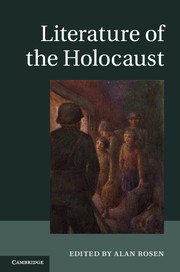Book contents
- Frontmatter
- Contents
- Notes on contributors
- Acknowledgments
- Introduction
- Part I Wartime victim writing
- Part II Postwar responses
- Part III Other approaches
- Chapter 12 Oral memoir and the Shoah
- Chapter 13 Songs of the Holocaust
- Chapter 14 Sephardic literary responses to the Holocaust
- Chapter 15 Anthologizing the Holocaust
- Chapter 16 The historian’s anvil, the novelist’s crucible
- Guide to further reading
- Index
- References
Chapter 12 - Oral memoir and the Shoah
Published online by Cambridge University Press: 05 June 2014
- Frontmatter
- Contents
- Notes on contributors
- Acknowledgments
- Introduction
- Part I Wartime victim writing
- Part II Postwar responses
- Part III Other approaches
- Chapter 12 Oral memoir and the Shoah
- Chapter 13 Songs of the Holocaust
- Chapter 14 Sephardic literary responses to the Holocaust
- Chapter 15 Anthologizing the Holocaust
- Chapter 16 The historian’s anvil, the novelist’s crucible
- Guide to further reading
- Index
- References
Summary
Time is running out
Recording the voices and filming the faces of Holocaust survivors has been perceived as necessary in order to establish this memory as the metonymy of the history of our time and to anticipate the risk of its extinction. “At least 100,000 survivor accounts have been collected since 1944 in many languages, contexts, and formats,” with most of them ending up in major or minor archives in dozens of countries. No scholar can even think of mastering them all.
In this chapter, I will try to outline a few questions of method, based primarily on interviews I have listened to or recorded myself, focusing on the Italian examples with which I am most familiar. One thing that makes oral history different is that the historian does not simply “collect” the stories, but also contributes to their creation and is inevitably involved in the result. Shoah narratives especially challenge the interviewer to cultivate a form of listening that combines personal empathy with historical objectivity, thus making such empathy an essential part of critical understanding.
- Type
- Chapter
- Information
- Literature of the Holocaust , pp. 193 - 210Publisher: Cambridge University PressPrint publication year: 2013
References
- 1
- Cited by



